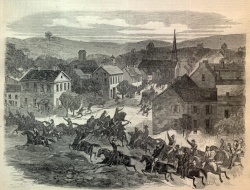Difference between revisions of "Portal:Inalienable Rights"
m |
(Replace the placeholder introduction with the beginnings of an introduction to Inalienable Rights) |
||
| Line 6: | Line 6: | ||
The phrase 'inalienable rights' was first used some time around 1760. It is synonymous with 'natural rights', which for some are 'God given rights'. | The phrase 'inalienable rights' was first used some time around 1760. It is synonymous with 'natural rights', which for some are 'God given rights'. | ||
| − | + | This concept of rights, which are due to everyone at birth, is the foundation of the rule of law - which is the foundation of the government, first of England, and then of the United States of America in the new world. Though both have at times strayed, these governments were set up as guardians of these natural rights and the people to whom they belong. | |
This portal is the place to assign categories and pages that present and discuss the concept of inalienable rights and various associated topics - such as English Common Law and the English Constitution. | This portal is the place to assign categories and pages that present and discuss the concept of inalienable rights and various associated topics - such as English Common Law and the English Constitution. | ||
Revision as of 23:12, 30 January 2014
Inalienable Rights
|
The phrase 'inalienable rights' was first used some time around 1760. It is synonymous with 'natural rights', which for some are 'God given rights'. This concept of rights, which are due to everyone at birth, is the foundation of the rule of law - which is the foundation of the government, first of England, and then of the United States of America in the new world. Though both have at times strayed, these governments were set up as guardians of these natural rights and the people to whom they belong. This portal is the place to assign categories and pages that present and discuss the concept of inalienable rights and various associated topics - such as English Common Law and the English Constitution. |
 Morgan's Raiders entering Washington, Ohio in August, 1863 |
Categories and contentsClick on arrows to see subcategories and articles. Things you can do
|
Sand Box
|